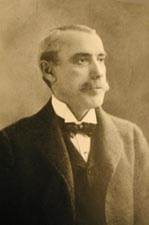Charles Henry Morrill | |
|---|---|
 | |
| Born | July 14, 1843 Concord, New Hampshire, United States |
| Died | December 14, 1928 Stromsburg, Nebraska, United States |
Charles Henry Morrill (July 14, 1843 – December 14, 1928) was an American businessman who played a role in the history of Nebraska. Morrill County, Nebraska is named after him.[1][2] He was born in Concord, New Hampshire, the only child of Ephraim and Mahala (Lampery) Morrill. His mother died when he was twelve, and he spent the remainder of his childhood living with his aunt Susan Gay and attending a nearby school, the New London Academy. In the summer of 1862 he enlisted at New London as a musician in Company I, 11th New Hampshire Volunteer Regiment. Three weeks later he married Harriet Zinnia Currier before leaving with his unit. He was present at many important battles, including the Battle of Fredericksburg and the Siege of Vicksburg and mustered out on June 4, 1865.
He states in his autobiography that after the war, he "took Horace Greeley's advice" (Go West, young man) and in 1866 went west in a covered wagon to establish a homestead near Marion, Iowa. Due to poor weather and being an inexperienced farmer, his crops failed for several years in a row. He was so poor he was unable to afford coffee. However, the weather and his fortunes turned around, and by 1870 he was producing both decent crop and a valuable herd of cattle.
In the spring of 1873, he moved his family of five and one hundred head of cattle to Stromsburg, Nebraska. There, he ran a farm and helped run a small store "with 6,000 Pawnee Indians less than 25 miles away."
- ^ Morrill, Charles Henry. The Morrills and Reminiscences. Lincoln: University Publishing Co., 1918.
- ^ "Charles H. Morrill". University of Nebraska, Lincoln. Retrieved 11 April 2014.